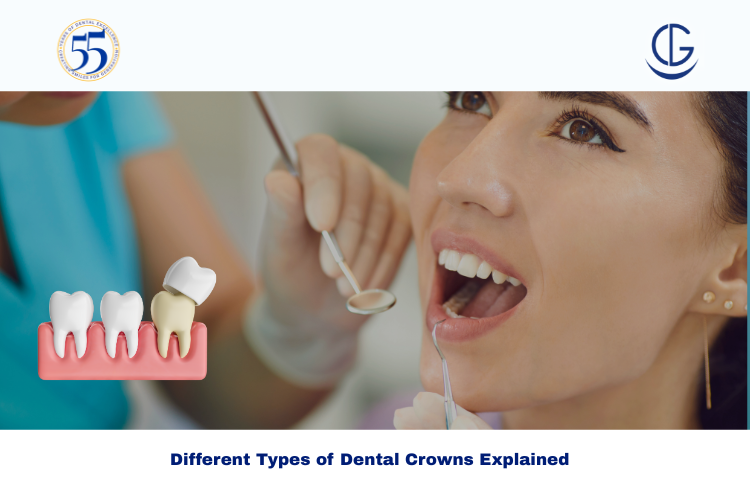Schedule Appointment



When it comes to restoring damaged teeth, dental crowns are one of the most effective solutions available. If you’ve been searching for information about the types of dental crowns, you’re in the right place. Crowns not only improve the appearance of your smile but also restore functionality and protect weakened teeth. At Dr Gowds Dental Hospital in Hyderabad, patients often ask which crown type best suits their needs. The answer depends on factors such as durability, aesthetics, and cost.
In this blog, we’ll walk you through the different types of dental crowns, their advantages, and when each is typically used.
A dental crown is a tooth-shaped cap placed over a damaged or weakened tooth. Its main purpose is to restore shape, size, strength, and appearance. Crowns are commonly recommended for:
Understanding the types of dental crowns helps patients make informed choices for long-term oral health.
Porcelain crowns are popular for their natural look, making them an excellent choice for front teeth. They closely match the color of your natural teeth, which is ideal for cosmetic purposes. However, they may not be as durable as other types for back teeth where pressure is greater.
Best for: Front teeth and patients looking for an aesthetic solution.
Similar to porcelain, ceramic crowns are highly aesthetic and biocompatible. They are metal-free, making them suitable for people with metal allergies. Ceramic crowns are durable and provide a natural finish, blending seamlessly with surrounding teeth.
Best for: Patients seeking a balance between appearance and strength.
Metal crowns (often made from gold, nickel, or chromium alloys) are known for their incredible strength and longevity. They withstand heavy chewing forces, making them ideal for molars. The downside is their metallic color, which is less appealing for visible teeth.
Best for: Back teeth where durability is more important than appearance.
PFM crowns combine the strength of metal with the natural look of porcelain. The metal provides durability, while the porcelain layer mimics tooth color. Over time, however, the porcelain may wear down or reveal a dark line at the gumline.
Best for: Both front and back teeth, offering a mix of durability and aesthetics.
Zirconia crowns are a modern option, known for their toughness and natural appearance. They resist chipping and can be color-matched to natural teeth. With advanced CAD/CAM technology, they are also quicker to produce.
Best for: Patients who want strength and aesthetics without compromise.
These crowns are more affordable and can be fabricated quickly. However, they wear down faster and are more prone to fractures compared to ceramic or metal crowns.
Best for: Temporary solutions or patients seeking lower-cost options.
Temporary crowns are used while waiting for a permanent crown to be fabricated. They are usually made of acrylic or stainless steel and protect the tooth until the final crown is placed.
Best for: Short-term protection and cosmetic purposes until permanent crown placement.
The choice depends on:
It’s important to discuss these factors with your dentist to determine the most suitable option. At Dr Gowds Dental Hospital, Hyderabad, our specialists guide patients through these decisions, ensuring the crown chosen matches both functional and cosmetic needs.
Dental crowns are a reliable solution for restoring teeth, whether for functional strength or cosmetic improvement. From porcelain and zirconia to metal and composite, each crown type has specific uses and benefits. By understanding the types of dental crowns, you can make an informed decision in consultation with your dentist.
If you’re considering dental crowns in Hyderabad, visit Dr Gowds Dental Hospital for expert advice and treatment. Your smile deserves the best care—don’t compromise when it comes to your dental health.
The most common types include porcelain, ceramic, metal, porcelain-fused-to-metal (PFM), and zirconia crowns. Each type has unique strengths and uses depending on the tooth location and patient needs.
Metal crowns, particularly gold alloys, are known for their longevity. Zirconia crowns also provide excellent durability while maintaining a natural look.
Zirconia crowns are stronger and more resistant to chipping, while porcelain crowns offer superior aesthetics for front teeth. The choice depends on whether durability or appearance is your priority.
The cost varies depending on the material. Metal crowns are generally more affordable, while zirconia and porcelain crowns are higher in price due to their aesthetics and durability.
Yes, Dr Gowds Dental Hospital offers a wide range of crown options including zirconia, porcelain, metal, and PFM crowns, tailored to each patient’s needs and preferences.